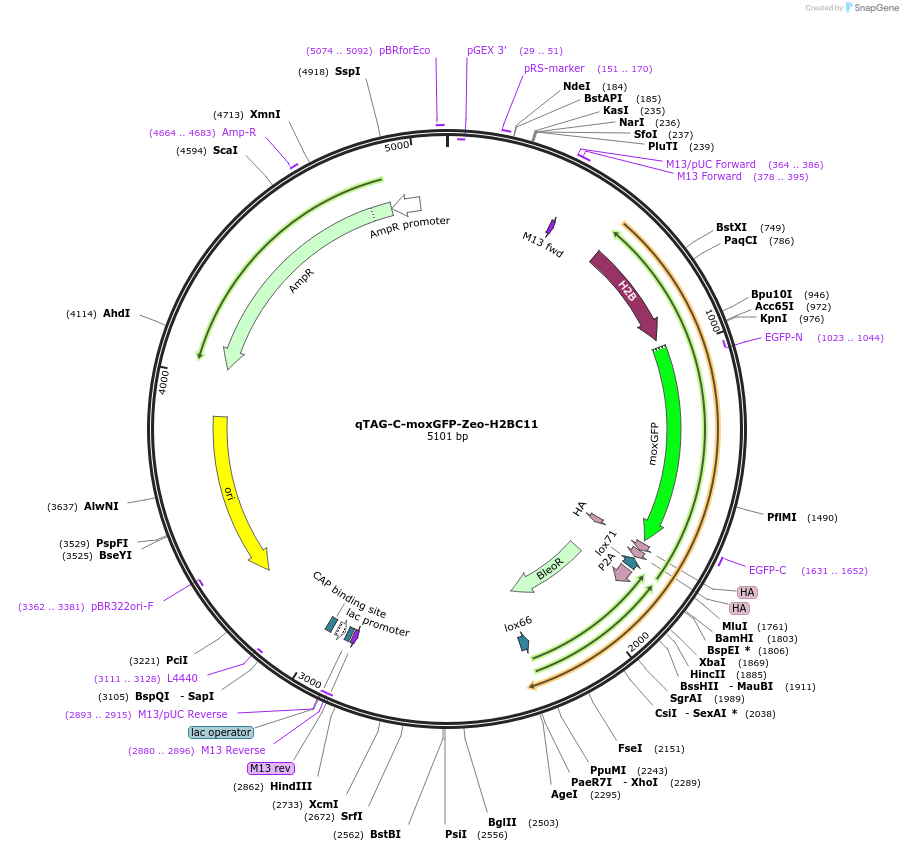qTAG-C-moxGFP-Zeo-H2BC11
(Plasmid
#207759)
-
PurposeDonor template for moxGFP-2A-Zeo insertion into the C-terminus of the H2BC11 locus for nuclei visualization. To be co-transfected with sgRNA plasmid px330-PITCh-H2BC11 Addgene #207755
-
Depositing Lab
-
Sequence Information
Ordering
| Item | Catalog # | Description | Quantity | Price (USD) | |
|---|---|---|---|---|---|
| Plasmid | 207759 | Standard format: Plasmid sent in bacteria as agar stab | 1 | $89 * | |
* Log in to view industry pricing.
Backbone
-
Vector backbonepUC19
-
Backbone manufacturerInvitrogen
- Backbone size w/o insert (bp) 2686
-
Vector typeMammalian Expression, CRISPR ; Donor Template
-
Selectable markersZeocin
Growth in Bacteria
-
Bacterial Resistance(s)Ampicillin, 100 μg/mL
-
Growth Temperature37°C
-
Growth Strain(s)DH5alpha
-
Copy numberHigh Copy
Gene/Insert
-
Gene/Insert nameH2BC11 Homology Arms flanking a moxGFP-Zeo Cassette
-
Alt nameH2BC11
-
SpeciesH. sapiens (human)
-
Insert Size (bp)2460
-
Entrez GeneH2BC11 (a.k.a. H2B/r, H2BFR, H2BJ, HIST1H2BJ)
Cloning Information
- Cloning method Unknown
- 5′ sequencing primer CTGCAAGGCGATTAAGTTGGGTAAC
- 3′ sequencing primer GGCTCGTATGTTGTGTGGAATTGT
- (Common Sequencing Primers)
Resource Information
-
Supplemental Documents
Terms and Licenses
-
Academic/Nonprofit Terms
-
Industry Terms
Trademarks:
- Zeocin® is an InvivoGen trademark.
Depositor Comments
To be co-transfected with sgRNA plasmid px330-PITCh-H2BC11 https://www.addgene.org/207755 . Please visit https://www.biorxiv.org/content/10.1101/2023.11.01.565029v3 for bioRxiv preprint.
These plasmids were created by your colleagues. Please acknowledge the Principal Investigator, cite the article in which the plasmids were described, and include Addgene in the Materials and Methods of your future publications.
-
For your Materials & Methods section:
qTAG-C-moxGFP-Zeo-H2BC11 was a gift from Laurence Pelletier (Addgene plasmid # 207759 ; http://n2t.net/addgene:207759 ; RRID:Addgene_207759) -
For your References section:
qTAG: an adaptable plasmid scaffold for CRISPR-based endogenous tagging. Philip R, Sharma A, Matellan L, Erpf AC, Hsu WH, Tkach JM, Wyatt HDM, Pelletier L. EMBO J. 2024 Dec 12. doi: 10.1038/s44318-024-00337-5. 10.1038/s44318-024-00337-5 PubMed 39668248



